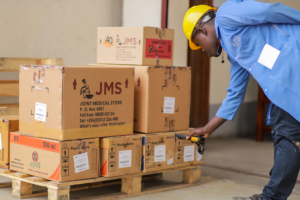Joint Medical Store is a private medical not-for-profit NGO established in 1979, as a wholesale warehouse provider formed by the Uganda Catholic Medical Bureau (UCMB) and the Uganda Protestant Medical Bureau (UPMB), with four branches and two distribution centres in the country. For 44 years the organisation has pursued its mandate across four key areas.
The first of these is in the procurement of warehousing and distribution facilities for pharmaceuticals and health supplies. Joint Medical Store supplies these to facilities for private not-for-profits and the government. The organisation also procures, installs, and maintains medical equipment across Uganda’s network of medical facilities, and sometimes beyond. It is also responsible for supplying buildings that can be used by health facilities across Uganda.
Finally, it provides procurement, warehousing, and distribution to its development partners, helping it manage the whole supply chain.
“We take commodities, house them and help to provide them to the population free of charge,” says Dr Bildard Baguma, Executive Director of Joint Medical Store.
But recently Joint Medical Store has added a fifth string to its bow, in the form of a private company called Joint Healthcare. It has brought Joint Medical Store into the manufacturing sector for health and commodities.
“We have an understanding with the Ministry of Health to provide these services,” Baguma tells us. “We are focused on ensuring that we provide high-quality products. Our job is not to look for the cheapest, but for the highest quality so that we can serve the people we sell to with the highest standards that they require.”
 The Right Product, at the Right Price
The Right Product, at the Right Price
With decades of experience in the fields of procurement, warehousing and distribution within the healthcare sector, Joint Medical Store has developed a wealth of competence across the field. It can not only provide commodities for distribution but also provide services through these facilities, supporting the healthcare organisations they serve up to and including financing.
“We can provide products on credit for up to 90 days so that healthcare organisations can do their work efficiently and plan better for the commodities they need,” says Baguma.
This has proved to be essential because health financing is possibly the biggest challenge facing the Ugandan healthcare sector right now.
“Most health financing is an out-of-pocket system, and this creates difficulties in facilities being able to provide the products patients need, when they need them,” Baguma says. “We try to provide facilities with financing for our products so that they can pay over time.”
But Joint Medical Store’s priority is not just ensuring that healthcare facilities can pay for products. It is also about ensuring that they receive products of the right quality, which is an ever-more complex challenge in this day and age.
“So many products have come into the country that have not been through the right channels,” Baguma points out. “Challenges such as antibiotic resistance are made more difficult when people cannot differentiate between what is a genuine product, and what is not,” explains Baguma.
This is an area where Joint Medical Store focuses a lot of its work, creating an elaborate quality management system that ensures products come from the right source, meeting specific requirements and documentation.
“For somebody to be prequalified to supply these products, we must carry out audits of where they are sourcing materials and ensure that all the products we bring in are tested,” Baguma tells us. “We have a mandate to ensure the quality of products, so use our own quality testing and quality control to test the products we bring in and supply to our customers.”
A Matter of Storage
But even when the sourcing and quality of the product have been confirmed, those products need to be stored under exacting conditions.
Joint Medical Store’s quality management system continues through the warehousing and distribution of the products. Temperature, humidity, and many other factors are continuously tested and observed to make sure products reach the patient in the optimal condition.
“The availability of adequate, pharmaceutical-grade warehousing and storage is a big challenge,” Baguma insists. “If you do not have your own warehouses, it is difficult to find ones that reach the appropriate standards.”
Joint Medical Store, as its name implies, owns its own warehouses in Kampala and other regions where the organisation has a presence. JMS has five warehouses spread throughout Uganda with space for 13,100 pallets, including 237 square metres of cold chain. The company is now constructing a warehouse for a further 10,000 pallets, which will be launched in early 2024.
“But when those are not sufficient, we look for warehousing with the right certification and quality control systems, ensuring our products are not compromised,” Baguma says.
 Maintaining Excellence
Maintaining Excellence
When it comes to products, and how those products are stored, Joint Medical Store is unyielding in its approach to quality, but there is one more crucial ingredient to ensuring Uganda’s healthcare sector can rely on it. That ingredient is its people.
“We recruit from the talent pool available within the country, primarily,” Baguma says. “We ensure people have the right qualifications and competencies to do their job.”
Maintaining the level of standards and qualification among Joint Medical Store’s 232 staff is done through Joint Medical Store’s “Centre of Excellence”.
“It is a gatekeeping system we use in-house in the recruitment and training of our staff,” Baguma points out. “We recruit staff and train them properly on the handling of all the medical products they have to work with, instilling in them the necessary competencies to work here. We then provide ongoing training to ensure they continue to build the necessary skills.”
It is clear that Joint Medical Store is a company working to the very highest standards, but while we are talking with Baguma it is clear that he is excited about something. He is talking to us at a pivotal moment in the organisation’s history.
For the first time, Joint Medical Store is moving into the manufacturing sector.
“We have entered into manufacturing. That is our vision for the future,” Baguma tells us. “We believe manufacturing quality products is crucial for the future of this country.”
At the same time, the organisation is advancing its digitalisation agenda, building a seamless interaction with its customers and the people they serve.
“Patients will no longer have to walk to the chemist,” Baguma says. “They can make the order and have it delivered at home. We are also looking at providing add-on services, for instance, to the facilities where we provide equipment.”
In our conversation with Joint Medical Store, the recurring theme is the incredibly high standards the company maintains, and in that spirit, the best way to ensure a job is done right is to do it themselves.







